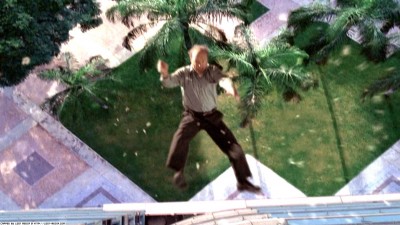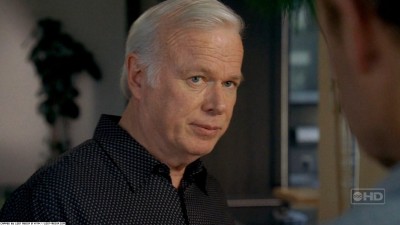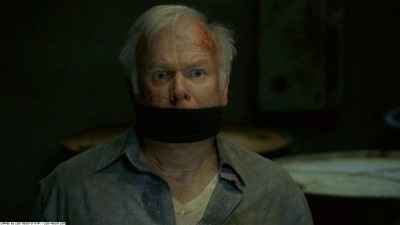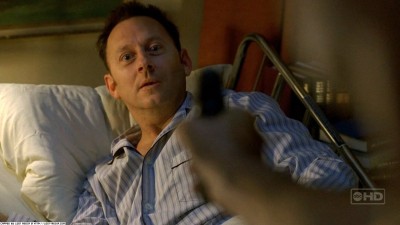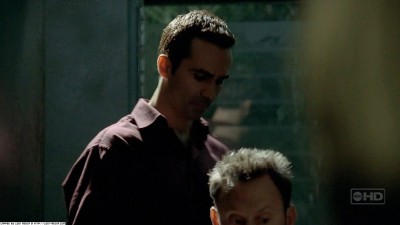Headache + sleep deprivation = bullet points.
In the interests of focus however, we do finally seem to have a clear picture of the purpose behind Locke’s actions, even if John himself isn’t quite sure what the proverbial finish line holds. He realizes he serves at the pleasure of the Island, and will do whatever is necessary to live by the precepts he thinks his environment is dictating to him. An obvious allegory to mankind living in harmony with the world around it, Locke is the conservationist Greenpeace to Ben’s consumptionist Wal-Mart. (That comparison works, right?) Nurture the earth, and it’ll nurture you. So, if you happen to break your back, just pick up some litter and Mother Nature will have you walking inside of a week!
Anyway, we know Locke is willing to do whatever it takes to preserve the Island and his place on it–but just how far would he go? And is he preserving the Island, or the more selfish preservation of his miraculous recovery from paralysis?
Whichever, Locke/Terry O’Quinn continues to be my favorite part of the show. The Locke-centric episodes, along with Desmond’s, have been by far the most entertaining and interesting of the series. The writers really seem to get up for writing this particular character, and O’Quinn is equal to the task every time. More, please.
Quick Hits
- “The man from Tallahassee,” both the episode’s title and the person Ben tells Tom to get him turns out to be none other than Locke’s father, who is definitively portrayed as the evil bastard he truly is this time around.
Speaking of Tallahassee, I seem to remember Sawyer making mention of “pulling a job in Tallahassee” somewhere in his past. He also happened to be imprisoned in Florida. I don’t think the prison was in Tallahassee (I await confirmation), but hooray for coincidence.
- I’d be surprised but not shocked if the man we saw at the end of the episode is anything other than the security system/Cerberus/smoke monster taking on yet another human form. That smoke monster certainly seems like something that one would find in a “magic box.” (Along with a white rabbit, six doves, a never-ending scarf, and a top hat.)
In each of the monster’s previous iterations (other than “Black Smokey”), it’s taken on the form of an individual intensely important or influential in the respective castaway’s life. Perhaps they’ve all been the result of Ben’s mastery over this “magic box.”
- Ben continues to illustrate how firmly in control he is, despite all appearances to the contrary. He asks Tom to get “the man from Tallahassee” early on in the episode, knowing full well he’ll make use of Locke’s father later on. The deck is stacked sharply in the chessmaster’s favor as he manipulates his pieces into position around the playing field. Sweet–three different mentions of games in one sentence!
Ben, however, does hint at how tenuous his hold on his followers may be. I don’t think he was being entirely deceptive when he said that the Others seeing him break a promise or reveal the illusion of their freedom would result in an overthrow that would send him packing. Ben desperately needs to maintain the illusion that the Others he’s recruited are their of their own free will. But to what aim? If, as some speculate, the goal of the group is to better the world, why does he feel it so necessary to deceive his group of hamsters, running merrily along in their wheels? Logically, doesn’t that have to mean that his aims aren’t so noble after all? We’ll see.
- We may have caught a glimpse of how the Others have obtained all their seeming omnipotence: through government documents. Locke is being interviewed for disability benefits at the beginning of the episode, and based on the interviewer’s questions, those forms would contain plenty of information about Locke’s life and times. Augment that with the stack of medical forms and police reports a broken back warrants, and the Others should have a pretty clear picture of Locke’s former life.
Another theory, which makes more sense: if Ben has some form of control over Cerberus, and we’ve seen Cerberus display the ability to scan and catalogue the memories of people it comes in contact with, then it would stand to reason Ben has access to all the information he needs about the castaways. [thanks to Clark Griswold]
- Locke’s birthdate: May 30, 1956. Make use of that as you see fit. (Which would be no use at all.)
- We get reacquainted with the good Doctor Alpert from Not in Portland. You’ll recall Alpert was the man recruiting Juliet to the Island cult, and likely engineering her ex-husband’s unfortunate meeting with a city bus.
- Notice the brand of whiskey Locke’s father was drinking? Desmond’s favorite, MacCutcheon’s.
